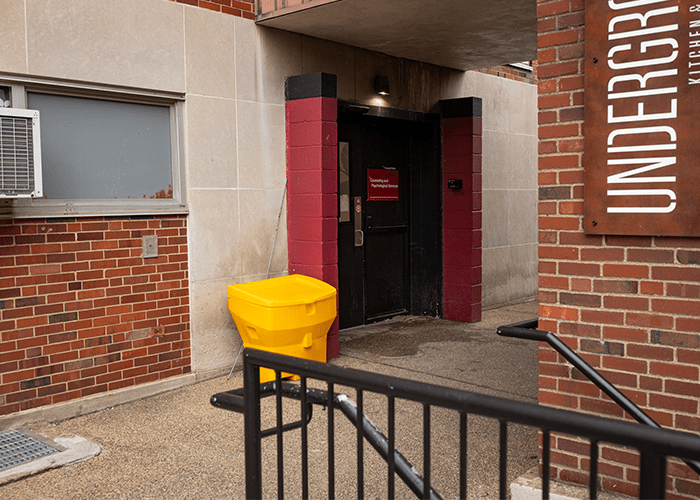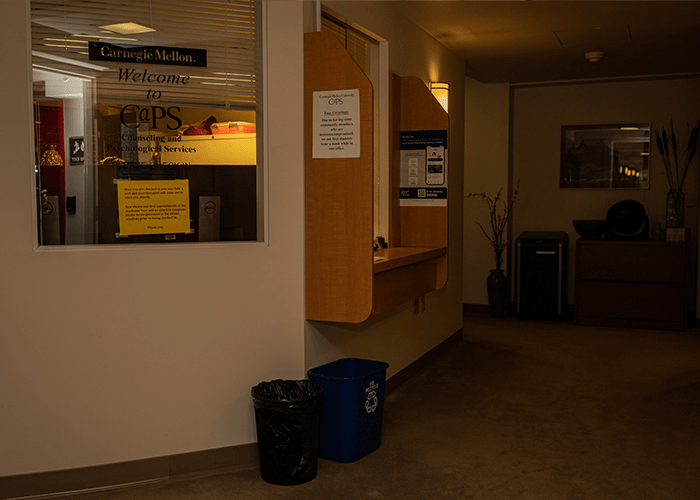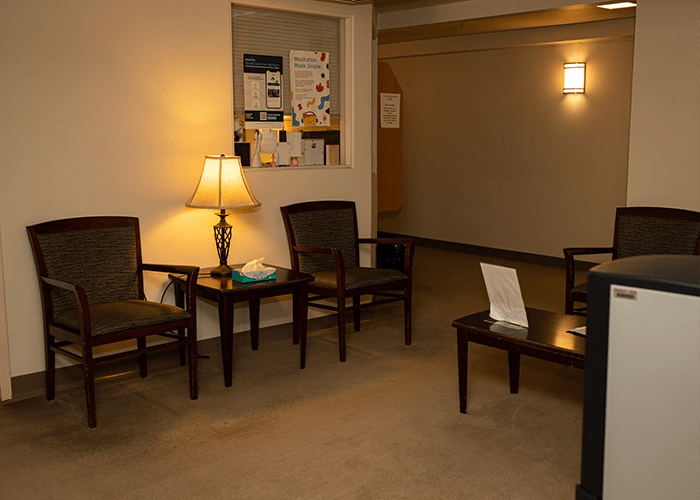The deadline to submit applications for the APPIC Doctoral Psychology Internship for 2025-2026 is now closed. For additional information, please contact Beatriz Palma, Ph.D.
2025-2026 Doctoral Internship Program for Health Service Providers
Carnegie Mellon's Counseling and Psychological Services Center (CaPS) operates within the Division of Student Affairs in a university setting which offers support for students beyond that of the counseling center. Collaborating with the greater university community affords a trainee exposure to the multidisciplinary aspects of working in a university counseling center. CaPS provides comprehensive psychological services to the campus community; both graduate and undergraduate students receive services through CaPS. While direct clinical service is a significant focus of CaPS, the counseling center also provides other services to the university community, including consultation and outreach programming.
Experience a university counseling center at its full breadth.
Training Opportunity
The doctoral psychology internship for Health Service Providers program is designed to allow the doctoral interns in psychology to experience a university counseling center at its full breadth. This includes clinical and support services provided by a typical university counseling center. Clinical services include intake evaluations, psychotherapy, group therapy, crisis/triage counseling, consultation, and case management. In addition to their clinical services, interns gain experiences in designing workshops for outreach programming and providing clinical supervision, and there may be opportunities to participate in other projects (e.g., an administrative research opportunity). During the academic year, up to 50% of a typical week is dedicated to clinical and direct services; this will decrease during academic breaks and the summer months.
The CMU CaPS doctoral internship in health service psychology is accredited by the American Psychological Association. Inquiries regarding the accreditation of our internship training program may be directed to:
APA Office of Program Consultation and Accreditation
750 First Street, NE • Washington, DC • 20002-4242
Phone: 202-336-5979
The Office of Accreditation’s web address may be accessed here: www.apa.org/ed/accreditation. You may also email the Accreditation Office at apaaccre@apa.org.
CaPS offers a range of support, seminars and professional development activities throughout the training year. In addition to two hours of individual supervision, one hour of supervision focus on crisis assessment and intervention, and one hour of supervision focusing on group intervention, psychology interns participate in various seminars, training, and peer support spaces.
Program Training Resources
Training Philosophy
CaPS views the doctoral psychology internship year as an extension from one’s previous training experiences with added opportunities to expand and hone one’s psychotherapeutic skills via supportive reflection on clinical, personal and professional development. The training program is designed to support interns to develop into well-rounded generalist psychologists at an early-career level. To this end, our training program emphasizes 1): attending to and supporting the intern’s developmental needs; 2): developing the intern’s professional and personal identity by cultivating self-awareness on one’s intersectional identities in context; and 3) integrating practice and clinical theory.
Our training model is developmental in nature and as such is sensitive to the individual needs of trainees with varying levels of knowledge and expertise. Training experiences are gradual throughout the year and based upon the trainee’s readiness as gauged by their supervisor(s), Assistant Director of Training, and the Executive Director.
Following a developmental framework, a trainee can expect training to include vicarious and experiential learning. Didactic structure is set up to additionally offer the explicit opportunity to more deeply integrate theory and practice, informed by psychological science.
Course of Training
Our internship year starts on the last weekday of July each year, and the month of August is viewed as a time for orienting interns to the CMU culture, CaPS culture, and the core components of our training program (brief psychotherapy, group therapy, triage, and outreach). In addition to didactic and experiential training that prepares interns for providing triage and consultation services, interns are further oriented to diverse components of services provided at CaPS, such as group and outreach programming. Didactic and experiential learning utilizes an apprenticeship, scaffolding model at the beginning weeks and months of the training year.
After the August orientation periods, interns enter the Fall semester with a full clinical and training schedule. For their clinical services, interns receive support from their primary supervisor and members of clinical training staff, including the intern’s TCC supervisor, group supervisors, outreach supervisors, the training director, and the entire team of administrative staff.
Training activities are built gradually in the Fall and Spring semesters. Interns participate in various seminars (e.g., didactic seminars with rotating presenters and topics, trainee clinical discussion group seminar, decolonizing critical consciousness seminar, supervision seminar, and the trauma seminar), and professional development activities (e.g., staff meeting, psychiatric rounds, peer support group, case conferences).
Socially, interns have a range of experiences with other trainees at CaPS and various staff to enrich their interdisciplinary professional experiences and skills.
With an aspiration to center on social justice values as an integral part of interns’ development, interns are encouraged and supported to reflect on their own intersectional identities when providing clinical services via consultation with their supervisors. The clinical services, seminar structure, and support offerings are structured to orient the interns around their multicultural awareness and their professional developmental growing edges, and how they intersect with working within systems. Psychology interns receive $300 annual fund for professional development activities that support their learning in topics pertaining to a multicultural approach.
It is expected that interns will be able to function with an increased sense of agency and independence as they move through the training year.
At the end of the internship year, interns will be involved in a variety of year-end activities, including offering feedback to the training program about their training experience, participating in the farewell ceremony, and saying goodbye to important relationships they have established throughout the training year. Interns are expected to make appropriate follow-up plans for all of their clinical and non-clinical activities in consultation with their supervisors. Interns strengths and ongoing areas of professional growth will be highlighted with the intern at the end of the training year.
Training activities in a typical week:
- 15-17 hours of individual psychotherapy and group therapy
- 4-5 hours of clinical supervision (2 individual, 1 group, 1 TCC/TCC group, 1 Sup of Sup)
- 2-4 hours of triage, crisis intervention, or consultation
- 4 hours of didactic or seminar activities
- 0-1 hours providing supervision
- 1-2 hours of trainee support group or peer support activities
- 2-3 hours of staff or administrative meetings
- 2 hours of administrative time (e.g., notes, preparing for outreach, etc.)
- 2 hours of professional development activities (e.g., reading, researching)
- Unspecified and variable time devoted to outreach planning, implementation, and case management
Treatment Philosophy
Clinical Activities
Individual Counseling and Psychotherapy
The opportunity to provide short and long-term counseling/psychotherapy under intensive supervision is a unique feature of the training program. The nature of counseling center work ebbs and flows, but interns can expect, on average, to carry 15-17 ongoing clients per week during the academic year. Interns are expected to video-tape and review all therapy sessions. Two hours of individual supervision will be provided each week with the primary supervisor. Interns are expected to review their videotapes with their supervisors.
Intake Assessment
Each intern will perform individual intake assessments and clinical consultations as part of their clinical training. Interns hone their assessment skills and clinical decision making abilities through this process. Intake assessment training will occur during the orientation process as well as throughout the year under individual supervision.
Case Management, Consultation and Referral Support (CCaRS)
Starting in September, interns will have the opportunity to work directly with our Case Management, Consultation, and Referral Support(CCaRS) Team. Interns are an integral member of CaPS staff, hence for four hours every week, interns provide emergency services/walk-in services to students in crisis. Triage services are provided through a team approach. Supervision of triage, consultation, and case management services is provided in vivo by fellow-clinicians on staff on the same triage team as well as in weekly scheduled supervision by a CCaRS supervisor.
Outreach
Interns are expected to participate in outreach activities at CaPS throughout the training year. At the beginning of the training years, interns will be trained to provide assigned outreach activities via an apprenticeship model. Additionally, interns are expected to participate in at least two outreach programs per semester, in addition to developing an outreach project before the end of the training year. Interns may be involved in the coordination of outreach requests from the university community. Due to the fluctuating nature of outreach requests, consultation and supervision with the Outreach Coordinator will occur once monthly and on an ad hoc basis.
Group Therapy
Interns are oriented to the Group program at CaPS and assessed for fit and interests in providing Group Therapy. Much like other components of clinical activities, interns’ training and development in the area of Group Therapy follows an apprenticeship model with scaffolding support by their group supervisor, who usually co-lead the assigned Group with the intern. Interns may initially join a pre-established group, and there are opportunities for interns to create and lead a group of their specific interests and expertise at the later portion of the training year. Availability of Group facilitation is based on CMU students’ interests and may vary.
Psychiatric Rounds
Psychiatric rounds are held every Tuesday as a space to consult with the psychiatrist regarding on-going clinical cases. Interns participate in weekly psychiatric rounds with their primary supervisors.
Supervision
Interns receive training in theory and practices of providing clinical supervision in the Fall semester, and gain experiences in supervising practicum students in the Spring semester.
Supervision
Individual Supervision
Each intern receives two hours of individual psychotherapy supervision per week with a primary supervisor. The primary supervisor is a clinical psychologist with the role of supporting an intern’s ongoing growth and development throughout the training year, in addition to supervising the intern’s individual psychotherapy cases. Consistent with CaPS treatment and training philosophy, clinical supervision is developmental in nature and grounded in an attunement for diverse human experience. CaPS supervisors come from a wide range of theoretical approaches. Interns can expect supervision to be a place to examine the therapist-client relationship, to observe the emergence of feelings and thoughts as it pertains to clinical work, and to engage in reflection on areas of personal and professional growth. In addition, supervision may involve discussions and open curiosity about all forms of differences between the trainee and the supervisors. Discussions about differences and power dynamics may inform how similar processes could emerge in clinical, institutional, and larger socio-cultural contexts.
CCaRS Supervision
Psychology interns receive one hour of weekly supervision from their CCaRS supervisors. CCaRS supervisors oversee interns’ cases that came through triage, case management, and consultation services. In addition to receiving clinical supervision on the cases, interns can expect to gain knowledge and experiences about resources and systems within and beyond CaPS and CMU. CCaRS supervision is informed by developmental theories, trauma-informed care, and social justice principles.
Group Supervision
Psychology interns receive one hour of weekly supervision on group therapy. At the beginning of the training year, supervision is facilitated by the group coordinator and focuses on promoting, advertising, programming, and planning for the group. Starting from the first week of co-facilitated a group, interns receive weekly 1 hr supervision from a staff member who is the co-leader of the group. The group supervisor is a source of support for the interns during the group sessions while overseeing the related programming, planning, and refining process of the specific Group. Group supervision is informed by Group theories with multicultural attunement.
Supervision of Supervision
Psychology interns participate in weekly one-hour supervision of supervision group when interns are supervising a junior trainee. Supervision of supervision is informed by supervision theories and techniques with attunement to intersectionality and human in context.
Seminars
Psychology interns participate in the following seminars throughout the training year.
- Didactic Seminar: The weekly didactic seminar is coordinated by members of the training committee, and led by rotating staff at CaPS in the Fall semester. The weekly, one-hour Didactic presentations and discussions are intended to contribute to trainees overall professional development and to the development of their professional identities. The focus of the didactic presentations are the theoretical, applied, and professional aspects of the practice of Health Service Psychology and that of University Counseling Center work. Additionally, interns can expect to reflect on the application to diversity and social justice topics with the weekly presentations guided and prompted by the presenter.
- Liberating Psychological Consciousness Seminar: This seminar seeks to interrogate the underlying assumptions in our field, how these assumptions inform our approach to the work, as well as how we perceive ourselves and, by extension, how we embody the role of therapist. The primary goals of the seminar are to: 1) increase consciousness around how dominant paradigms have shaped the broader field of mental health in theory and practice, 2) transcend these paradigms through exposure to and curiosity about alternate paradigms, and 3) promote self-discovery and awareness.
- Trauma Seminar: This seminar is an integral part of CaPS internship training program. With the objective of providing clinical training for trauma-informed care, the purpose of the weekly one-hour seminar is to introduce, discuss, and critically reflect on existing literature on theories and treatment approaches for victims and survivors of various forms of violence, including interpersonal violence, community-level violence, and socio-political violence. The covered topics include: the theory of complex trauma, neurobiology and co-morbidity of trauma, the trauma recovery model, trauma treatment approaches, sociopolitical trauma and community healing, and trauma in cultural/historical context.
- Case Conference: Interns participate in case conferences in the spring semester with CaPS staff. Participants of case conferences will take turns to present a case. The cases may be a client in ongoing therapy, a triage situation, a group case, or an outreach experience. In addition to presentation skills, interns gain experiences in requesting, receiving, and offering feedback to others, consistent with professional consultation practices. Presenters are asked to present cases and pay attention to issues related to diversity, therapeutic process (e.g., transference and countertransference), systems, and beyond.
- Trainee Clinical Discussion Group: This weekly, open discussion group for CaPS trainees provides participants the opportunity to give voice to their experiences as clinicians, which may include working with particular clients, questions about developing professional identity, possible tensions within the systems where work is conducted or within the systems clients find themselves affected by, emerging ethical dilemmas, frameworks for understanding psychological and interpersonal functioning, biases and insights that may be operating given the clinician’s personal history, cultural background, etc. The group’s facilitators are present and available to offer reflections, assist with group interactions, identify themes, and secure the safety of the group’s process. Group participants are invited to bring a supportive stance toward other members of the group and stay open-minded with an attunement to one’s own internal processes. Ideally, the group will form a working community that supports clinical development for its members by establishing a culture in which disclosure is welcomed and where privacy is safeguarded, and by cultivating a lived sense of securing collegial support for the often-difficult work we face with our clients and within our encompassing professional contexts.
Evaluation Process
Interns can expect to receive feedback from staff as colleagues on an ongoing and in vivo basis. To encourage bi-directional learning, interns are encouraged to provide feedback to their supervisor on an ongoing basis.
There will be a mid-year and end-of-year formal evaluation for each intern. The formal evaluations are written and discussed between the intern and their supervisors. The evaluation will be based on internship goals, expectations, and objectives. Consistent with scientific principles and the core of Health Service Psychology, areas of evaluation are assessed in the following nine areas:
- Research
- Ethical and legal standards
- Individual and cultural diversity
- Professional values, attitudes, and behaviors
- Communication and interpersonal skills
- Assessment
- Intervention
- Supervision
- Consultation and interprofessional/interdisciplinary skills
Additionally, all training staff meet bi-annually to share observations and feedback about interns’ performance, and interns may receive additional feedback at these additional touch points.
To promote bi-directional learning, interns complete a supervision feedback form to provide feedback to their supervision at mid-year and at the end of the year. This procedure is to offer structural support to review the progress of supervision, and allow adjustment for supervision to meet the interns training needs.
Candidates with specific interests in the intersection of UCC work, depthful/relational/human-centered psychotherapy, and social justice aspiration are encouraged to apply.
Consistent with CaPS Inclusion and Mental Health Statement, the training program strives to offer a training environment that acknowledges and takes steps toward recognizing harm and the many challenges individuals face. The training program welcomes candidates who bring intersectional identities to be a part of the center. Individuals with open curiosity, interests in giving and receiving feedback, and flexibility will be the best fit for this program.
Application and Selection
CaPS utilizes the APPI application system through APPIC. Visit the APPIC website to find out more about the AAPI Online Application. The application deadline for our program is November, 15th, 2025. Our APPIC membership number is 2279.
Required Doctoral Preparation
- Completed a minimum of at least 500 direct hours in which at least 400 of those hours are doctoral hours of intervention (excluding assessment). Students with less direct hours due to the impact of COVID-19 pandemic are welcome to apply and we ask that applicants address this matter in their cover letters.
- passed comprehensive exams
- extensive experiences with individual therapy
- curiosity and interests in learning about: (a) UCC works, (b) depth-oriented/human-centered brief therapy theory and practices, and (c) social justice, diversity, equity, and inclusion topics
Preferred Experiences and Qualification
- Previous university or college counseling center experience
- demonstrated interests and commitment in social justice and a multicultural lense (e.g., social engagement project, completion of graduate-level multicultural courses, etc.)
- experiences with group therapy, outreach presentations, triage, and assessment
- dissertation proposal passed by the interview date
Required Materials to Apply through the Portal
- Cover letter.
- APPIC Application for Psychology Internship (AAPI)
- Transcripts for all graduate coursework
- Curriculum Vita
- Three letters of reference. Two of the letters must be from recent clinical supervisors.
Interviews are typically virtual. Selected applicants can expect to be notified in the third week of December 2025.
Note: The Counseling Center adheres to the procedures established by the Association of Psychology Postdoctoral and Internship Centers (APPIC) for notifying candidates. Internship offers will be coordinated through the APPIC Internship Matching Program. This internship site agrees to abide by the APPIC policy that no person at this training facility will solicit, accept or use any ranking related information from any intern applicant. For information on this program and all forms associated with the Program please visit the APPIC website: www.appic.org.
Stipend & Benefits
The stipend for the internship year is $44,000 and interns receive the same health, vision, dental, and PTO benefits as regular full-time staff. Please see the full list of staff benefits on CMU human resource website.
In addition to the $300 annual fund for professional development activities that support psychology interns’ on topics pertaining to Inclusion and Mental Health. Interns also receive three professional development days to be utilized toward approved professional development activities (e.g., dissertation defense, presenting at a conference, attending graduation, taking the EPPP, etc.)
Initial Placement Data
|
Initial Post-Internship Positions |
2020-2021 |
2021-2022 |
2022-2023 |
2023-2024 |
2024-2025 |
|
Total # of Interns who were in the cohort |
2 |
3 |
0 |
3 |
3 |
|
Total # of Interns who did not seek employment because they returned to their doctoral program and are completing doctoral degree |
0 |
0 |
NA |
0 |
0 |
|
University Counseling Center |
2 |
2 |
NA |
2 |
2 |
|
Veteran Affairs Medical Center |
0 |
0 |
NA |
0 |
0 |
|
Academic University/Department |
0 |
0 |
NA |
0 |
0 |
|
Independent Practice Setting |
0 |
1 |
NA |
0 |
0 |
|
Community Agency |
0 |
0 |
NA |
1 |
|
|
Hospital |
0 |
0 |
NA |
0 |
1 |
|
Other |
0 |
0 |
NA |
0 |
0 |
NA= not applicable

Get to know the caps office
Entrance to CaPS from Morewood Avenue







Interns are valued members of the CaPS team.
In this video, walk through CaPS to get ready for your first day.